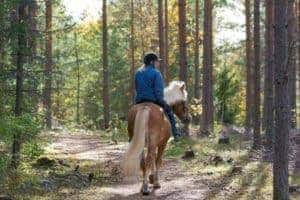
The Dangers of Foxtail in Your Horse’s Hay
Signs your horse has eaten foxtail and how to mitigate it in your pastures.

Signs your horse has eaten foxtail and how to mitigate it in your pastures.

Pasture maintenance is necessary for controlling weedy grass species that can be dangerous to horses.

Is one grass hay variety more palatable than another? Should I feed my horse the first or second cutting of hay? Equine nutritionists answer these questions and more about this essential forage.

Is one grass hay variety more palatable than another? Should I feed my horse the first or second cutting of hay? Equine nutritionists answer these questions and more about this essential forage.

Buttercups can cause mouth pain and blisters, drooling, oral and gastric ulcers, colic, and diarrhea in horses that eat them.

From winter and summer annuals to perennials and biennials, learn how to prevent and manage pasture weeds.

Weed management in horse pastures requires time, dedication, and ongoing effort from farm owners, but it’s crucial for promoting healthy forage for horses to eat.

Our equine nutritionist gives advice on how to prevent weeds in your horse pastures.

If we want to keep our trails and public lands open to horses, we must be responsible riders who care for the land and coexist with other trail users.

Fall is a good time to evaluate the quality of your horse pastures, because it is easy to see which weeds were most prevalent and uncontrolled during the summer and are now large and seed-producing.

Broadleaf plants, such as dandelions and ragweed, aren’t the only weeds that can infiltrate pastures. Here’s how to control grassy weeds that can be prominent in summer pastures, including crabgrass, yellow foxtail, and nimblewill.

Proper management of pastures on small acreage can mean better grazing for your horses and reduced hay costs.

Learn about horse coat colors, skin conditions, pasture weeds, parasites, horse properties, and more.

An owner worries about her horse eating thistle. An equine nutritionist responds about the risks.

Popular slideshows included those on skin conditions, horse properties, pasture weeds, the Rio Olympics, and more.

Researchers believe the Malva parviflora weed was behind the deaths of four Australian horses.
Stay on top of the most recent Horse Health news with
© 2022 Copyright Statement dolor sit amet, consetetur sadipscing User Terms, sed diam nonumy eirmod tempor invidunt ut labore et dolore magna aliquyam erat, sed diam voluptua. At vero eos et accusam et justo duo dolores et ea rebum. Stet clita kasd gubergren, no sea takimata sanctus est Lorem ipsum dolor sit amet.
"*" indicates required fields